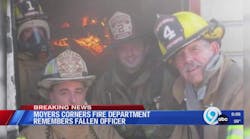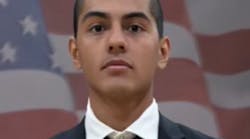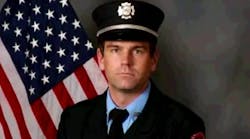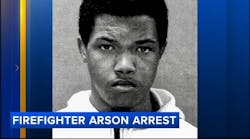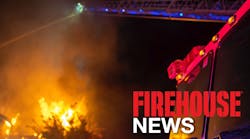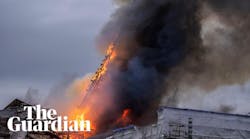During a long-ago conference, my buddies and I spent time discussing the state of affairs in the fire service. Central to the discussion was the fact that younger firefighters and officers do not seem to know and be aware of what we aging veterans take as gospel. Those of us who initially engaged in the conversation were on the far side of age 50. Each of us had been in the fire service at least since Lyndon Johnson was President. There were those, however, who harked back to the Kennedy and Eisenhower years. I mention this to give a perspective on the discussion.
We were comparing notes on the problems inherent in the delivery of fire protection and EMS. As with all long-serving fire officers, opinions were available on any topic that came up for discussion. At some point during the evening's festivities, an interesting counterpoint was noted. All of the folks on the south side of the table were 30 years of age or younger.
We began to notice quizzical looks on the faces of the younger firefighters when the topic of conversation turned to the late Lloyd Layman, the late John T. O'Hagan, and the late Abbott and Costello. While each of us on the north side of age 50 nodded knowingly about the wisdom imparted by Layman and O'Hagan, our younger associates puzzled over which Stone Age characters we were discussing. (Hint: Search for them on the Internet.)
The part that shocked me was that none of these younger troops knew who Abbott and Costello were. As a Jersey Boy, these men from the Garden State were comedy heroes in my youth. For you younger types, they were a burlesque comedy team who achieved a certain amount of Hollywood and television fame in the 1940s and 1950s for their zany antics, such as the "Who's on first?" routine.
It then occurred to us that we had just identified one of the primary problems at work throughout the fire service. We older troops simply take for granted that the younger people will automatically know what we are talking about. The corollary to this is that on the fireground, we expect our newer troops to automatically act and perform like we veterans do.
Some of our greatest problems in the fire service come from the fact that we take too much for granted. After nearly 45 years in the business, a great deal of what I do is ingrained. I act or react based upon a body of knowledge accumulated over a long period. I know these things and unless I share them, no one else will.
For many years, my buddies and I have been discussing the problems with the ways in which knowledge is shared with our younger fire people. This has all occurred in the intervening years since that fateful get-together. You may be wondering why it has taken so long for it to emerge here. Truth be told, my buddies and I were wondering whether it was just our observation or whether this view is more widely held in the fire service. Many times, you and I learn things as we do them. Of course, we read textbooks and attend classes, but more often than not, it is the way in which we apply this knowledge that helps us to make it a part of our operational psyche. We agreed that the problem is widespread and prevailed upon me to begin addressing this gap in fire service knowledge.
Perhaps one of the best examples I can offer comes from fire apparatus pump operations. Like many of you, I attended the schools and the drills. In addition, I read the right books. However, it takes a human instructor, combined with hard experience, to home in on the topic. In my case, two people stand out for their efforts in shaping my skill as a pump operator. The first was a gentleman named Mr. Martin. He was one of my instructors at the U.S. Air Force Firefighting School, which in those days was at Chanute Air Force Base in Rantoul, IL.
Mr. Martin was a patient man who knew the job of a pump operator inside out. You did not pass his course without demonstrating that you could pump the two models of U.S.A.F. pumper apparatus at the school: the 750A and the 530B. Thanks to his efforts, I arrived at my first duty station in Alaska with a good rudimentary set of skills. These skills were honed over time by continuing practice under the watchful eyes of veteran driver/operators.
The second person who stands out in my memory is the late Herb Foster. Herbie was the driver on Engine Company 11 when I arrived there as a rookie in 1973. His advice was really quite simple and he lived his advice at every fire we attended. He would say to me, "Kid, your job is to get water for our company. Once you get it for us, if you can help another company, do it. But never steal the water from your own guys."
So it was that I learned to operate a pumper nearly 40 years ago — through a combination of learning and doing under the watchful eyes of someone who knew how to do the job really well. These days, we call this type of human interaction "mentoring." In a mentoring relationship, an organizational veteran is paired with a new member in such a way that the experience and wisdom of the veteran is passed on to the younger individual. Sadly, far too many organizations fail to do any kind of mentoring. What is worse, many younger people reach the officer ranks who have never had the benefit of being mentored. They lack the tacit knowledge that can be gained only in a one-on-one sharing experience.
A friend of mine did her doctoral dissertation on the concept of tacit knowledge in a government agency. She discovered that a great deal of the knowledge contained within the brains of the organizational members is never passed along to others. Another discovery was that the ways in which people want to receive their knowledge varies from generation to generation. Younger people want to learn, but they want to learn in a way that is comfortable for them.
Far too much knowledge is being lost because those in positions of leadership and longevity have simply decided not to share what they know. They have adopted a posture of selfishness. "I learned it myself, and so will those young whippersnappers." Believe me when I tell you that I have seen this on more than one occasion.
This is what my buddies and I have pledged to work at changing. That is the reason for this column. It is my hope that my work has created some form of an informal mentoring system. If I fail to share what I have spent a lifetime learning, shame on me.
It is my hope that my words can help you to make the transition to being a new fire service leader a bit easier. For some of you, the transition from riding backwards and taking orders to that of riding the right front seat and being expected to give orders is sudden, and comes without a great deal of preparation.
In my case, it was a simple as going from the back step of Engine Company 11 to the right front seat of Engine Company 18 after a short promotional ceremony. Thankfully, I had served time as a crew chief in the Air Force and had been brought to that position over time, after a period of training and mentoring. Others were not as fortunate.
For some of you, reaching the right front seat comes only after an intensive period of studying and a thorough testing process. For others of you, the process involves nothing more than winning an election. In either case, the process of mentoring can ease the transition.
My research indicates that a new generation enters the fire service once every seven to 10 years. If you do not learn about them, they will be unable to benefit from your wisdom, because you will:
- Fail to share it with them
- Not know how to share it with them
- Share it in a way that will not be understood by them
- Or share it in a way that will alienate them
In the months and years to come, it is my hope that the Lord will allow me to continue to share what my buddies and I have learned through the years. I would suggest that you save this information. Over time, it may prove to be a helpful tool.
DR. HARRY R. CARTER, Ph.D., CFO, MIFireE, is a Firehouse® contributing editor. A municipal fire protection consultant based in Adelphia, NJ, he is the former president of the International Society of Fire Service Instructors. Dr. Carter is a past chief and active life member of the Adelphia Fire Company. Currently chairman of the Board of Fire Commissioners for Howell Township District 2, he retired from the Newark, NJ, Fire Department in 1999 as a battalion commander. He also served as chief of training and commander of the Hazardous Materials Response Team. Dr. Carter is vice president of the American Branch of the Institution of Fire Engineers (MIFireE). He recently published Living My Dream: Dr. Harry Carter's 2006 FIRE Act Road Trip, which was also the subject of a Firehouse.com blog. He may be contacted at [email protected].
